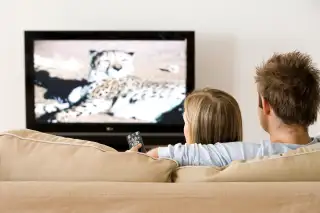6 Tricks to Keep From Vegging in Front of the TV After Work

The Bureau of Labor Statistics released its annual survey of how America uses its time last week. Compared to 2003 when the survey started, we spend more time working and watching TV. We are sleeping a bit more these days, but that extra shut-eye and screen time comes at a price. We spend less time socializing, eating, and engaging in religious or volunteer activities.
"I think that people are working a lot harder and there’s just a lot more that they’re expected to do,” says Roy Cohen, career coach and author of The Wall Street Professional’s Survival Guide. “I think it may just be overload. It’s easy just to veg out and watch TV when you feel like everything at work is just in overdrive. There’s a tendency to not want to be exposed to it when you get home,” he says.
Cohen and other experts say there are some things you can do, though, to resist the siren song of the recliner at the end of the day. Follow these and you might find that you have to start DVRing those nighttime shows.
Plan ahead before you leave the office. “Take time toward the end of each day to plan ahead for the next day,” says James Craft, professor of business administration at the Katz Graduate School of Business at the University of Pittsburgh. Doing this before you leave work will keep you from starting the day stressed out, or getting absorbed in reality TV to escape the stress the night before. Craft suggests identifying a few specific goals or tasks that must be done that day, then gathering the contact info, files, documents, or other material you’ll need to jump right in.
The same pre-planning trick also works for after-work activities. “Schedule activities in advance so you have a plan of commitment,” Cohen says.
Cut the caffeine. "Reduce coffee and sodas to keep you going at work," advises career coach Todd Dewett. You don't have to give it up entirely, but cutting back — especially in the afternoon — will help you avoid crashing right when you get home. "Instead, for one third of your caffeine consumption substitute a short walk," Dewett suggests. "This is a great way to cognitively rejuvenate without caffeine." Earlier research has found that taking walks during the workday boosts well-being and motivation, so it has a double benefit. Even five minutes can do the trick.
Give yourself something to look forward to. “A person needs to have something to do that they enjoy, is different, and that they can anticipate,” Craft points out. “That way, they’re not just going home with nothing to do but flop down and watch TV.” Put something you like to do on your schedule like any other appointment and that Law & Order marathon suddenly looks less appealing. For example...
Make plans with other people. Most of us are less likely to bail on a planned activity when other people are participating, too. “Include friends and family in physical activities,” says Chris Boyce, CEO of corporate wellness company Virgin Pulse. “Suggest that everyone goes for a walk after dinner instead of zoning out in front of the TV,” he says. Even if it’s not strenuous, the activity is good for you, and spending time socializing instead of sitting in front of a screen will recharge your mental batteries, he says.
Kick the habit. “People get used to telling themselves that they’re exhausted and just don’t have the energy for anything else except television,” says Joseph G. Gerard, assistant professor of management at Western New England University. Sure, TV engages without demanding anything from you, but spending your evenings in front of a screen can become a habit before you even realize it. “It’s easy… to get caught up in a favorite show or two,” Gerard says. “A lot of people don’t realize when they fall into bad habits.” Experts say it takes several weeks to break a habit, so plan for a couple of months of TV alternatives, he advises. If you stick with it, you’ll probably find that vegging out has lost its appeal.
Put down the phone. A lot of the expert advice to find another engaging activity is a moot point if you’re going to be bent over, tapping on a screen. It’s not necessary to go into full-on detox mode; just put the devices down somewhere for two or three hours in the evening so you can do other things without interruption. “When you’re always attached to your phone, you’re going to sit on the couch. You’re going to be less active,” Cohen says.